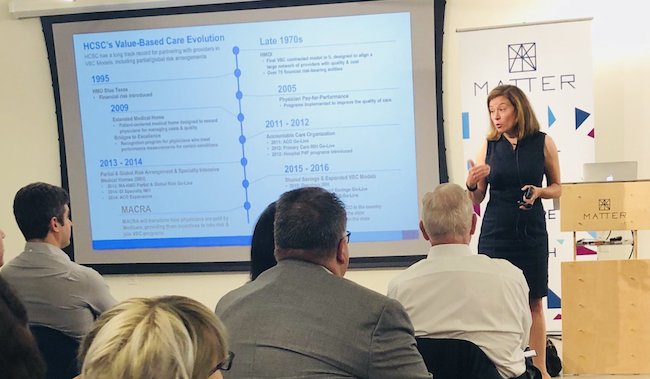The future of accountable care organizations
Lee McGrath of Blue Cross and Blue Shield of Illinois talks value-based care

During a captivating talk at MATTER, Lee McGrath, divisional vice president of innovation and strategy at BlueCross and Blue Shield of Illinois, discussed the future of accountable care organizations (ACOs).
Below are a few noteworthy points from Lee’s talk.
How is fee-for-service failing us?
“We get exactly what we pay for. We pay fees for services. Doctors treat sickness. That’s what we pay for, so that’s what we get. But that fails to manage the patient, and it really fails in particular for people who have chronic illnesses. The patients are asked to take on more responsibility but they have no idea what that means.
“I learned this lesson the hard way. My husband is a Type 1 diabetic and I didn’t really understand healthcare until I took over his healthcare. We don’t care how high our deductible is. We plan for it, we save for it, but every January we just pay out our deductible and then that’s it. He’s a very good Type 1 diabetic, but still it’s expensive. So we’re not even getting what we paid for there.”
Changing the way people get paid.
“Value-based care — or ACOs, or whatever acronym we want to use right now — is fundamentally changing the way people get paid.
“We all know that if you don’t have a primary care provider (PCP) visit within seven days of being discharged from the hospital you’re probably going to wind up readmitted. So now there are transition of care folks who are calling and [asking]: Do you have a PCP visit? Do you have discharge instructions? How can I help you? That would have never have happened if we didn’t get into value-based care.”
We’re still learning.
“We are fundamentally changing how the money is moving. Now value-based care is about paying for outcomes and quality and value. All of those things are incredibly difficult concepts. How is value defined? How is quality defined? Are we all going to agree on the numerators and the denominators? All of these things are really complicated, but we’re in the middle of it.
“We’re all learning. [Value-based care] is completely new. We need to have more open conversations about what is working, what’s not, and how we can improve and really partner together.”
Putting patients first.
“As Blue Cross and Blue Shield, we do something called CAP scores where we call up our ACO patients and ask, ‘Did you have a good experience with your physician?’ [The physicians] get a few extra bucks if the answer is always yes. So now providers are spending a lot of time training themselves and their front staff, nurses and medical assistants, to be really nice to patients.”
Know your neighbors: the truth behind value-based care.
“At the end of the day, with value-based care, we are trying to get the physician to do a better quality [job] at a lower price point. You can do that in a variety of ways depending on whether they’re specialists, depending on if they are provider-owned, or if they are hospital-owned. You have to meet providers where they are or you’re not going to incentivize them. You have to know the provider and the community and get them to respond to incentives so it’s not just an ACO — it is value-based care.”
Want to hear more talks like this? Sign up for our mailing list to stay up-to-date on upcoming events and programs at MATTER.



